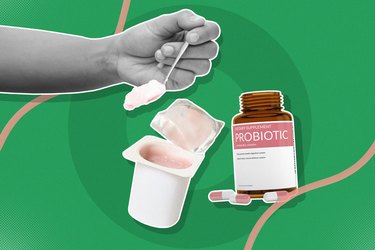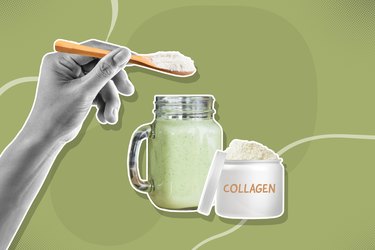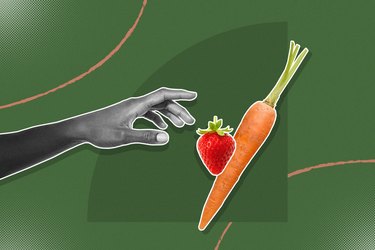
Equal, Splenda, Sweet'N Low — artificial sweeteners have been household names for decades, but the debate surrounding their safety hasn't let up.
The ongoing controversy has a lot to do with the effects of artificial sweeteners on the body. Research suggests the faux sweet stuff may have complex effects on the body's long-term blood sugar control, the makeup of the gut microbiome and more.
Video of the Day
First of All, What Are Artificial Sweeteners?
Before we dive into the effects of artificial sweeteners on our health, it's important to know what they are and how they're made. One note: The science community refers to these ingredients as "low-calorie sweeteners," or LCS, a term that encompasses both artificial sweeteners like Splenda as well as natural sweeteners like stevia.
Artificial sweeteners are lab-made additives that are either very low in calories (think: 4 calories per packet) or "non-nutritive," meaning free from calories altogether.
All LCS require some form of chemical manipulation and processing. For example, sucralose (aka Splenda) is a chlorinated derivative of real sugar that largely passes through the GI tract without getting absorbed, per a November 2016 review in Nutrition Reviews. The result is a calorie-free, ultra-sweet substance that can taste up to 600 times sweeter than regular sugar (sucrose), per the FDA.
Aspartame, the substance used in Equal and Nutrasweet, is a low-calorie sweetener made of amino acids — it tastes about 200 times sweeter than sugar, per the FDA.
LCS are meant to satisfy a sweet tooth without spiking blood sugar or serving up many calories as our bodies don't fully absorb them. While that sounds straightforward enough, research suggests there may be more to the equation.
Are Artificial Sweeteners Safe?
All high-intensity sweeteners currently approved for use in the U.S. have been deemed safe for consumption, per the FDA. However, third-party research sometimes suggests otherwise.
Effects of Artificial Sweeteners on the Body
Your Gut May Get Out of Whack
By now, we're aware our gut microbiome is very important: The trillions of bacteria that reside in our intestines affect our immune function, mood and more. But LCS may alter the makeup of our microbiome, potentially causing some of the bad gut bugs to proliferate.
Animal studies have linked sucralose to decreased diversity in the gut microbiomes of rats, with the sweetener lowering the amount of health-promoting bacteria (like bifidobacteria and lactobacilli) in the animals' intestines, per a January 2019 review in the journal Advances in Nutrition.
When it comes to humans, though, research on artificial sweeteners' effects on gut health is lacking. One October 2019 study in The British Journal of Nutrition reported that high doses of sucralose had no effects on the makeup in people's gut bacteria. Granted, the study only lasted a week. Adding a packet of Splenda to your morning coffee for 30 years may play out differently.
For now, evidence of the adverse effects of LCS on human gut health is "not strong," says Wendy Bazilian, DrPH, RDN, a California-based dietitian and author of Eat Clean, Stay Lean. Of course, a lack of data doesn't mean the additives are OK for the gut. "In classic scientist speak, more research is needed on this topic," Bazilian says.
It's Unclear if Your Risk of Getting Cancer Will Rise
The debate over whether artificial sweeteners increase cancer risk is long-standing and still happening to this day.
In fact, the World Health Organization (WHO) released a July 2023 report stating that aspartame may "possibly cause cancer" in people who consume it in large amounts. These findings were in part based on the International Agency for Research on Cancer's classification system for cancer risk. Aspartame received the grade "2B," which translates to "possibly carcinogenic to humans," per the WHO website.
Despite this, the FDA disagrees with the report, stating that just because aspartame is "possibly carcinogenic to humans" does not mean aspartame is actually linked to cancer. As such, the FDA's acceptable daily intake of aspartame remains at 50 milligrams per one kilogram (about 2.2 pounds) of body weight.
This debate sprung up in the 1970s, when a major study published in the journal Environmental Health Perspectives reported that saccharin (aka Sweet'N Low) was associated with a greater incidence of bladder cancer in lab rats and mice.
Those findings led the government to slap warning labels on any product containing the sweetener in 1977. Since then, a number of studies have reported that the sweetener is not, in fact, cancer-causing in humans. As a result, the National Institutes of Health (NIH) said in 2000 that saccharin should no longer be considered a potential carcinogen, per the FDA.
Since the research has primarily been done in animal or in vitro studies, there's no clear link between artificial sweeteners and human cancer risk at this time, Bazilian says. "While it's been suggested that the plausible mechanisms are not the same for humans as in rats, that doesn't mean they don't exist with absolute certainty, either," she adds.
The bottom line: "Certainly, there is less risk from not consuming them than consuming them. They're not essential to the diet or human health," Bazilian says.
They Probably Won't Make You Gain Weight
In theory, LCS should promote weight loss when compared to the real deal. After all, table sugar serves up 4 calories per gram while alternatives like Sweet 'n Low deliver zero. But research suggests it may not be that simple.
One April 2015 study in the Journal of American Geriatrics Society found a dose-dependent relationship between diet soda intake and waist circumference in older adults — meaning, the more artificially sweetened beverages they drank, the more abdominal weight they gained. Of note, excess belly fat, also called visceral adiposity, is known to raise the risk of heart disease and type 2 diabetes, per Harvard Health Publishing.
There are a number of possible mechanisms by which LCS may promote weight gain. For example, animal studies have shown the sweetener acesulfame potassium, or ace-K, may lower levels of the appetite-suppressing hormone leptin, per research conducted by the NIH.
"It could also be that there is compensatory eating happening along with the inclusion of LCS, meaning a false sense of freedom with other foods because you're saving in another," Bazilian says. "What's more, the foods LCS are added to, or the foods they're enjoyed with, could be sources of calories from fats, protein and carbs that may be in excess of daily needs." Think: sipping a diet soda along with a meatball sub and potato chips.
All that said, LCS probably don't cause weight gain on their own. And if they're included in a diet that's nutritious along with a consistent exercise regimen, they may be a helpful tool for weight loss, Bazilian says.
Just don't count on them regularly: "They could contribute to weight loss in small part by the few calories they may 'save,' but they are not something I recommend in my practice," Bazilian says.
But They May Lead to More Cravings
Because LCS are significantly sweeter than natural sugars, they have the power to desensitize our tastebuds to sweet flavors over time. "As a result, many people who regularly consume artificial sweeteners may find naturally sweet foods like fruit and honey less appealing and may develop an increased desire for sweet-tasting foods,” says Tamar Samuels, RD, a New Jersey-based dietitian and co-founder of Culina Health. Cue the cravings.
They Might Mess With Your Blood Sugar
LCS are often recommended for folks looking to control their blood sugar levels. Yet despite being sugar-free, some studies suggest that the additives can still negatively affect glycemic control.
Early research shows that artificial sweeteners like sucralose might activate sweet taste receptors, triggering the release of insulin, like regular sugar does, according to a September 2018 article in The American Journal of Clinical Nutrition.
Indeed, people with type 2 diabetes who ate artificial sweeteners were observed to have higher levels of insulin resistance compared to people who did not, per a January 2020 cross-sectional study in the Journal of Family Medicine and Primary Care.
Why does that matter? "Insulin resistance can lead to elevated blood sugar levels, which can contribute to a number of health problems including type 2 diabetes, increased risk for cardiovascular disease, kidney damage, eye damage and increased risk of infection," Samuels says.
"Elevated blood sugar can also make it difficult to lose weight, cause low energy and promote cravings for sweets and carbs."
Tip
Samuels typically recommends minimizing LCS, even for people with pre-diabetes or diabetes, due to their effects on cravings and insulin. “If you have a sweet craving, you're better off choosing fresh fruit so you can get the additional water, fiber and antioxidants that are beneficial for people with diabetes,” she says. “If you want a sweetener, I recommend choosing one from natural sources like stevia or monk fruit and having them in limited amounts on occasion.”
The Bottom Line
The jury is still out on what really happens when we regularly eat or drink LCS. Until we have more concrete evidence, Bazilian recommends avoiding them.
"I encourage enjoying sweet flavors and incorporating them in a balanced way," she says. "Removing LCS can help you taste the more subtle but also more complex flavor origins of naturally sweet foods like fruits."
For most people, a moderate amount of real sugar can safely fit into a healthy eating routine. If you find yourself hooked on the ultra-sweet additives, start by dialing back your intake slowly.
"I recommend gradually decreasing your portions of these sweeteners over time for an easier transition," Samuels says. "Start with having one less packet per week until you have eliminated them completely and replace them with one to two teaspoons of natural sugars like honey or pure maple syrup [as needed]."
- British Journal of Nutrition: “Short-Term Impact of Sucralose Consumption on the Metabolic Response and Gut Microbiome of Healthy Adults”
- Journal of American Geriatrics Society: “Diet Soda Intake is Associated with Long-Term Increases in Waist Circumference in a Bi-Ethnic Cohort of Older Adults: The San Antonio Longitudinal Study of Aging”
- Nutrition Reviews: “Biological Fate of Low Calorie Sweeteners”
- JACC Cardiovascular Imaging: “Visceral Adiposity and the Risk of Metabolic Syndrome Across Body Mass Index: the MESA Study”
- The American Journal of Clinical Nutrition: “The Not-So-Sweet Effects of Sucralose on Blood Sugar Control”
- The NIH Catalyst: “Artificial Sweeteners and Leptin; Impaired Lipid Storage and Starvation”
- Harvard Medical School: “Abdominal Fat And What To Do About It”
- Journal of Family Medicine and Primary Care: “Effect of Artificial Sweeteners on Insulin Resistance Among Type-2 Diabetes Mellitus Patients”
- World Health Organization: "Aspartame hazard and risk assessment results released"
- FDA: "Aspartame and Other Sweeteners in Food"
- International Agency for Research on Cancer: "Homepage"



